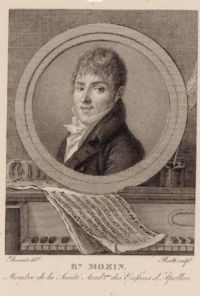Benoit Mozin
Benoit François Mozin called le jeune (the younger) (21 March 1769 – 1 December 1857) was a French composer.
Life

Born in Paris, Mozin[1] was first a pupil of François-Joseph Gossec, and then became a professor at the Conservatoire de Paris (until 1802), where Victor Dourlen was among his pupils. He later married the daughter of Louis Joseph Guichard,[2] singing teacher, in his third marriage.
They had two children: the eldest, the marine painter Charles Mozin, discoverer of Trouville-sur-Mer, and his brother, the composer Théodore Mozin, second Grand Prix de Rome in musical composition in 1841 (a pupil of Henri-Montan Berton and Fromental Halévy).
Mozin was a member of the "Société académique des enfants d'Apollon"[3] and of the Société du Caveau.
He left about 60 scores for the piano including Souvenir de Trouville, Op. 19, a title revived by his son Theodore (Quadrille, Op. 22).
After he died in 1857 in Sèvres, Mozin was buried at the cimetière du Père-Lachaise (8th division).[4]
Works (BnF)
- À l'auguste famille des Bourbon, romance sur des paroles de madame Mozin
- Les quatre saisons, musique italienne, composition by Guillaume André Villoteau with piano accompaniment by Benoit Mozin
- 6e pot-pourri d'airs connus pour le piano forte (1792)
- Concerto de Maestrino, arranged for harpsichord or forte piano
- Six romances avec accompagnement pour le forte piano (1796)
- Scene of the 1st act of Gluck's Alceste arranged for the forte piano (1800)
- Air del signor Biani, accompaniment by Mozin le jeune
- Les glouglous, chanson bachique on lyrics of (Béranger)
- Pour toi, romance, lyrics by M. de Segur jeune
- Les souvenirs, collection of contradances for the piano forte
- Un précepte d'Hippocrate, bacchanalian song (1822)
- Les adieux d'un cosaque, fantasy for the piano forte dedicated to S.A. Monseigneur Alexandre prince of Kourakin (Alexander Kurakin)
- Le retour du carnaval, contradanses and walzes
- Souvenir de Trouville, galop en rondo for piano Op.19
- Sonata Op.12
- 3rd collection of romances with accompaniment for the piano forte (1799)
- 3 sonatas for the piano forte (1798)
References
Sources
- Constant Pierre: Le Conservatoire national de musique et déclamation, Paris 1900, Imprimerie nationale